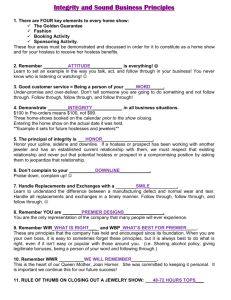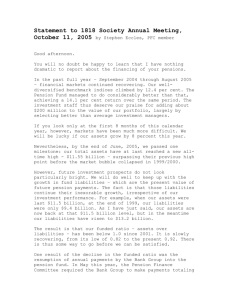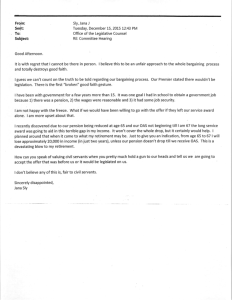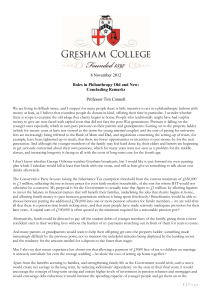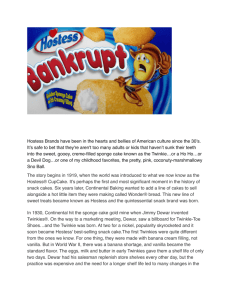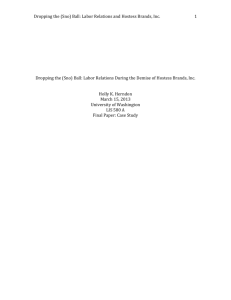Hostess Pension Diversion Could Spell Big Trouble
advertisement
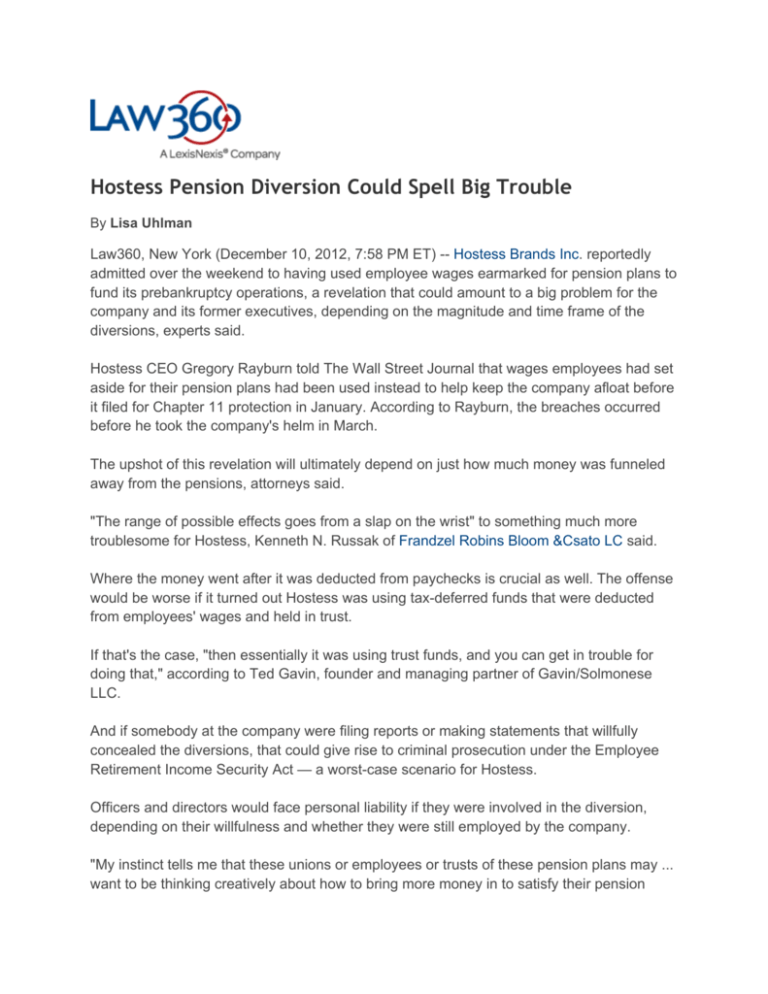
Hostess Pension Diversion Could Spell Big Trouble By Lisa Uhlman Law360, New York (December 10, 2012, 7:58 PM ET) -- Hostess Brands Inc. reportedly admitted over the weekend to having used employee wages earmarked for pension plans to fund its prebankruptcy operations, a revelation that could amount to a big problem for the company and its former executives, depending on the magnitude and time frame of the diversions, experts said. Hostess CEO Gregory Rayburn told The Wall Street Journal that wages employees had set aside for their pension plans had been used instead to help keep the company afloat before it filed for Chapter 11 protection in January. According to Rayburn, the breaches occurred before he took the company's helm in March. The upshot of this revelation will ultimately depend on just how much money was funneled away from the pensions, attorneys said. "The range of possible effects goes from a slap on the wrist" to something much more troublesome for Hostess, Kenneth N. Russak of Frandzel Robins Bloom &Csato LC said. Where the money went after it was deducted from paychecks is crucial as well. The offense would be worse if it turned out Hostess was using tax-deferred funds that were deducted from employees' wages and held in trust. If that's the case, "then essentially it was using trust funds, and you can get in trouble for doing that," according to Ted Gavin, founder and managing partner of Gavin/Solmonese LLC. And if somebody at the company were filing reports or making statements that willfully concealed the diversions, that could give rise to criminal prosecution under the Employee Retirement Income Security Act — a worst-case scenario for Hostess. Officers and directors would face personal liability if they were involved in the diversion, depending on their willfulness and whether they were still employed by the company. "My instinct tells me that these unions or employees or trusts of these pension plans may ... want to be thinking creatively about how to bring more money in to satisfy their pension claims," Stephen Metz of Shulman Rogers GandalPordy&Ecker PA said. "I wouldn't be surprised if there are claims brought against officers and directors for breaches of fiduciary duty." However, should the diversions simply be a matter of pension money having been tossed in a bucket with other funds, the result would be just another claim in the bankruptcy case, rather than any actionable culpability. "All too often, the money doesn't get segregated for the pension plan. ... It's not the end of the world, it's not like commingled trust fund tax money," said Hugh Ray, head of McKool Smith PC's bankruptcy practice. "What really happens here, when you commingle pension money with other money, is that a claim is created ... against the estate, for the use of the pension money for operating reasons." The money is fungible unless it's kept in a separate account, Ray noted. If the situation is merely that money that was to have gone to the pension plan in the future was acting as operating funds, the issue is minor and one that likely happens pretty frequently, according to Gavin. It's normal for a distressed company to use funds that should go to union pension plans, he said. That's why unions sit on committees in bankruptcies: Their pensions are never fully funded, and they are treated as unsecured creditors. "It's not surprising to me that they wouldn't have been able to make certain contributions to the multiemployer pension plans," he said. But at the minimum, important questions must be asked before it becomes clear exactly what standards were breached and who will ultimately be held responsible, including third parties. If money was commingled in an operating account and not moved directly to the proper pension account, this could create liability for the accounting firm charged with making sure it ended up where it was supposed to, Ray said. "It could very well be, factually, that there's some accountant liability here," he said. "But no one would know that until there's some inquiry." The company's union contracts could come into play in that investigation, according to Gavin. "A lot of what will ultimately happen will be determined by, first, what the terms of the collective bargaining agreements with the unions were as to how these funds were to be treated before they're paid, and second, if they were employee withholding [funds] or whether they're just operating cash,” Gavin said. If it's the former of those options, he said, "that's about as serious as you're going to get in this situation.” The weekend's revelation could also give Hostess' bakers union fodder for its bid to get a Chapter 11 trustee appointed in the case, if it argues that management hadn't been honest about where employees' money was going before and after the bankruptcy. "The judge will have to evaluate whether or not the failure rises to the level of gross mismanagement that would warrant the appointment of a trustee," Russak told Law360. And as the circumstances of the diversions unfold, a number of related issues are likely to come before U.S. Bankruptcy Judge Robert D. Drain as he continues to oversee the winddown of the estate. As long as Hostess remains in Chapter 11 protection, he'll be in charge of deciding the viability of potential claims. "Obviously, a bankruptcy judge has a lot of discretion on what to do and will be trying to make a decision that's in the best interests of the estate and the creditors," Metz said. "The judge has got a lot of different constituencies to look out for." Meanwhile, though, there will be plenty of inquiry into what happened with the would-be pension funds, according to Ray, who said what would ultimately doom or save Hostess was how long the problem had been happening. "What really needs to happen is, somebody needs to find out when did the money go into what accounts and for how long, and until you know that, you don't know how bad this is," he said. "You just don't know." Hostess is represented by Corinne Ball, Heather Lennox, Robert Hamilton, Ryan Routh, VeerleRoovers and Michael Silberfarb of Jones Day. The case is In re: Hostess Brands Inc. et al., case number 7:12-bk-22052, in the U.S. Bankruptcy Court for the Southern District of New York. --Editing by Kat Laskowski and Katherine Rautenberg.

